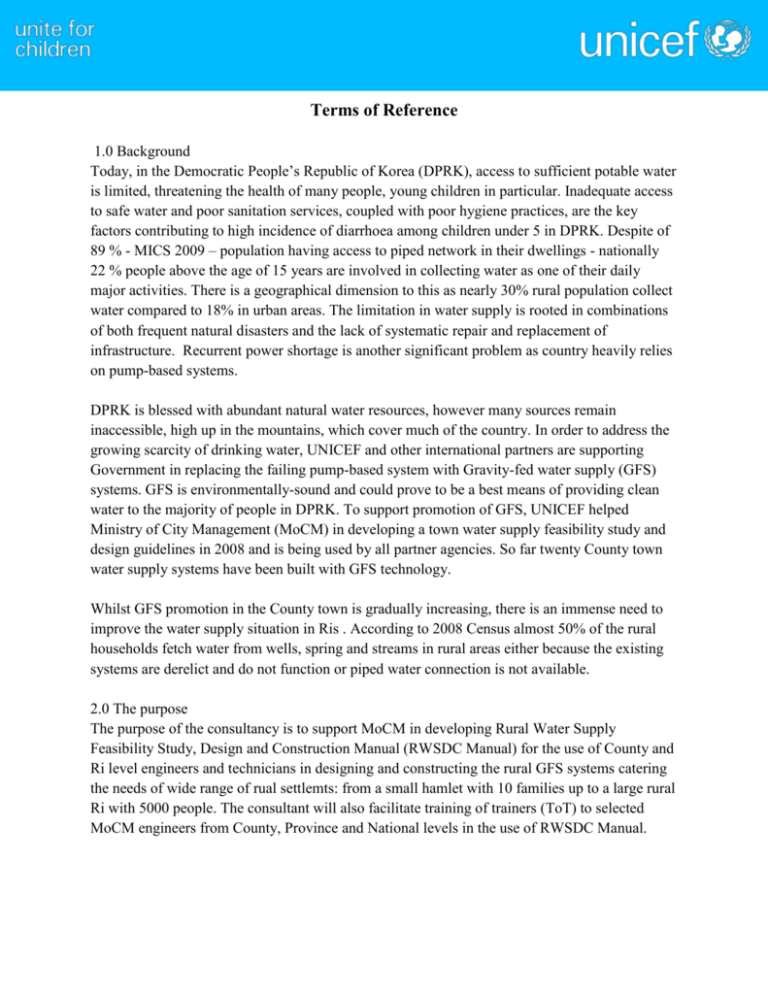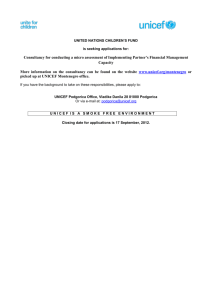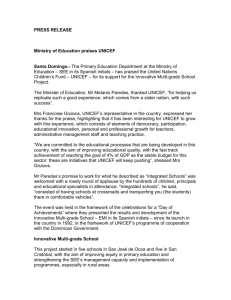Terms of Reference
advertisement

Terms of Reference 1.0 Background Today, in the Democratic People’s Republic of Korea (DPRK), access to sufficient potable water is limited, threatening the health of many people, young children in particular. Inadequate access to safe water and poor sanitation services, coupled with poor hygiene practices, are the key factors contributing to high incidence of diarrhoea among children under 5 in DPRK. Despite of 89 % - MICS 2009 – population having access to piped network in their dwellings - nationally 22 % people above the age of 15 years are involved in collecting water as one of their daily major activities. There is a geographical dimension to this as nearly 30% rural population collect water compared to 18% in urban areas. The limitation in water supply is rooted in combinations of both frequent natural disasters and the lack of systematic repair and replacement of infrastructure. Recurrent power shortage is another significant problem as country heavily relies on pump-based systems. DPRK is blessed with abundant natural water resources, however many sources remain inaccessible, high up in the mountains, which cover much of the country. In order to address the growing scarcity of drinking water, UNICEF and other international partners are supporting Government in replacing the failing pump-based system with Gravity-fed water supply (GFS) systems. GFS is environmentally-sound and could prove to be a best means of providing clean water to the majority of people in DPRK. To support promotion of GFS, UNICEF helped Ministry of City Management (MoCM) in developing a town water supply feasibility study and design guidelines in 2008 and is being used by all partner agencies. So far twenty County town water supply systems have been built with GFS technology. Whilst GFS promotion in the County town is gradually increasing, there is an immense need to improve the water supply situation in Ris . According to 2008 Census almost 50% of the rural households fetch water from wells, spring and streams in rural areas either because the existing systems are derelict and do not function or piped water connection is not available. 2.0 The purpose The purpose of the consultancy is to support MoCM in developing Rural Water Supply Feasibility Study, Design and Construction Manual (RWSDC Manual) for the use of County and Ri level engineers and technicians in designing and constructing the rural GFS systems catering the needs of wide range of rual settlemts: from a small hamlet with 10 families up to a large rural Ri with 5000 people. The consultant will also facilitate training of trainers (ToT) to selected MoCM engineers from County, Province and National levels in the use of RWSDC Manual. Rural Water Supply Consultancy Notification – UNICEF Pyongyang 3.0 Contents of the RWSDC Manual: The “RWSDC Manual” will focus on feasibility study, design, construction and operation and maintenance of small scale GFS systems. The document will provide guidelines, standard formats, charts and tables to collect all necessary information required from the field to collate and develop design document manually. The manual will include instructions on how to compute the hydraulic calculations, sizing of the different structures, and source protection /management. The hydraulic design of the system has to be done by using the NOMOGRAM in an A4 size paper or any other easy to refer manual system. The manual will include the details of standard structures (different types of intakes, collection/sedimentation tank, apparatus such as air release valve and washouts, interruption chamber, storage tanks, distribution valve chambers, etc) including pipes and fittings to be installed in these structures. The manual will include detail design and drawings and fittings of 5m3, 10m3, 15m3, 25m3, 40m3, 60m3, 80m3 and 100m3 storage tanks using RCC. In DPRK, MoCM normally uses PVC and PE pipes for water supply mains and distributions with GI and brass fittings/valves (CI valves above 75mm) for different apparatus such as washouts, air-release valve and distributions chambers. This needs to be kept in mind while working out the fittings. The document will also discuss in detail the key construction and installation aspects of GFS system such as civil engineering works (plain concrete, reinforced concrete and plaster) in water bearing structures and pipe installation and anti-freezing measures in mainlines, valve chambers, distribution networks and at taps in schools and health facilities. 4.0 Major Tasks to be accomplished 1. Review rural water supply guidelines and manuals from different countries in the region with similar geographical contexts and prepare the outline of RWSDC Manual; 2. Develop a draft RWSDC Manual with detail guidelines, standard formats, charts and tables to collect all necessary demographic and technical data from the field to collate and develop manually the design, estimates and bill of quantities of a sound GFS system. The manual will include instructions on how to compute the hydraulic calculations, sizing of the different structures, and source protection /management. The document will also address the key construction, installation and operation and maintenance aspects; 3. Prepare a trainers training package for engineers involved in training the provincial and county technicians in designing and supervising the construction of rural water supply systems; 4. Based on the new training package, facilitate a 6 day long field-based trainers training to selected MoCM engineers (about 30 persons) on feasibility study, design and construction of rural GFS systems using the Draft RWSDC Manual; 5. Working together with PSU of MoCM, finalise the RWSDC manual incorporating lessons/feedbacks from the trainers training. 5.0 Methodology: Initially the consultant will work from his or her country of residence in collecting information and reviewing rural water supply guidelines and manuals from other countries in the region with similar geographical contexts and prepare a draft outline of RWSDC Manual. The consultant will present the outline of the Manual to UNICEF and MoCM and further work on the document with Project Support Unit of MoCM upon arrival in the country of assignment. The outline will also be shared and feedback obtained from WASH Theme Group members as well. The consultant will have opportunities to visit field (2- 3 visits) for practical acquaintances with various types of water sources (both improved and unimproved) and discuss with county engineers and technicians. The consultant and MoCM engineers will work together on the document and prepare a Draft version with all necessary information and tables. The Draft will be submitted to UNICEF within 15 days of consultant’s arrival in the country. Consultant will prepare a trainers training package for engineers who are involved in training the provincial and county engineers in designing and supervising the construction of rural water supply systems. Based on this package The consultant will facilitate a 6 day long trainers training to selected MoCM During this training, the participant will develop a comprehensive feasibility study and design document for one pilot ri project. The hands-on trainers training will provide the opportunity to test the practicality of the document. Working together with PSU of MoCM, the consultant will review the document and incorporate lessons/feedbacks obtain from the training and finalize the document. 6.0 Duty Station: The consultant will be based in UNICEF office in Pyongyang, however he/she will also be required to travel to field on as and when needed basis. 7.0 Time frame and deliverables: The consultancy is expected to start the work from 15 June 2011 with the following expected activities and deliverables: Dates 15 Jun – expected start date - 7 days from home) 11 July 12 July 13 – 15 July 16 – 27 July 29 July 1 – 2 August 3 – 9 August 10 – 12 August 12 August Activities Review existing guidelines and information and develop forms, formats for feasibility and design and develop outline of the manual. Consultant arrives in the country Presentation of draft outline of the manual to UNICEF and MoCM Visit to rural communities to observe existing water projects/ sources Work together with MoCM in developing RWSDC manual 9:30 – 12:30 - Share the draft Manual with UNICEF and MoCM and 15:00 – 17:00 Present the document to WASH Theme Group Develop ToT training package for engineers Facilitate 6 days ToT training to MoCM Engineers Work together with MoCM to finalise the document Afternoon - Departure from Pyongyang 8.0 Key Skills and Experience Required ►At least 10 years of water supply design and implementation experience in developing countries with significant GFS component; ►Advanced university degree in civil / public health /or mechanical engineering; ► Proven analytical skills in conceptualizing and developing sectoral plans and reviews; ►Experience of developing guidelines and manuals in water supply system design; ►Experience of facilitating technical trainings in water supply design and construction; ►Understanding of the work of the UNICEF and other international agencies in water sector development in developing countries is an advantage; ►Strong communication skills (written and oral); ►Experience of working with an interpreter is desirable. Interested candidates should submit an up-to-date UN Personal History Form (P-11), Curriculum Vitae, a letter of interest outlining relevant experience for the tasks, including information about where they are currently based on or before 30 May 2011 directly to this e-mail address rbhusal@unicef.org with cc: to zmaltar@unicef.org . Please state in the subject line: “Rural Water Supply Consultant”. The United Nations Personal History P11 form can be downloaded from UNICEF website at http://www.unicef.org/about/employ/index_53129.html.





